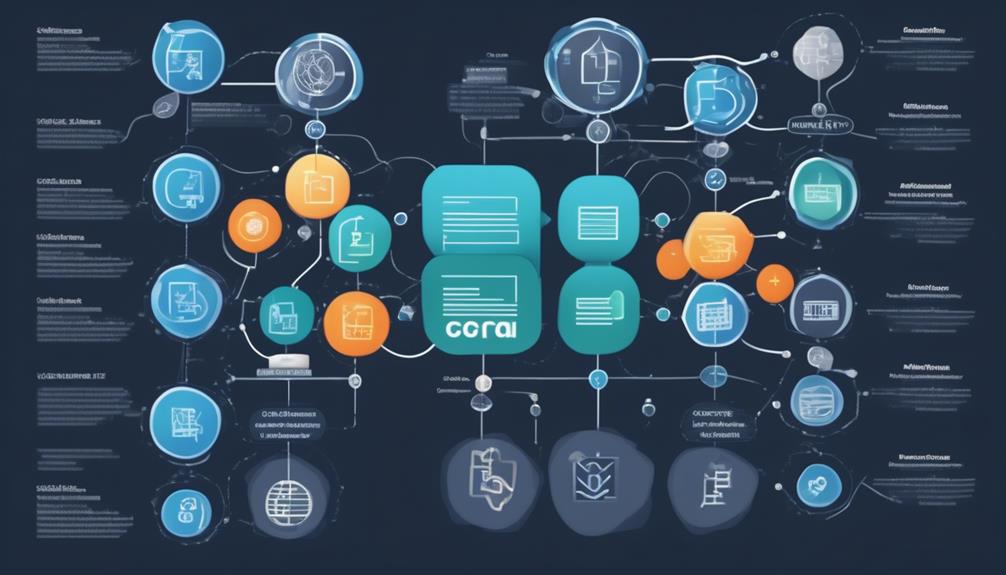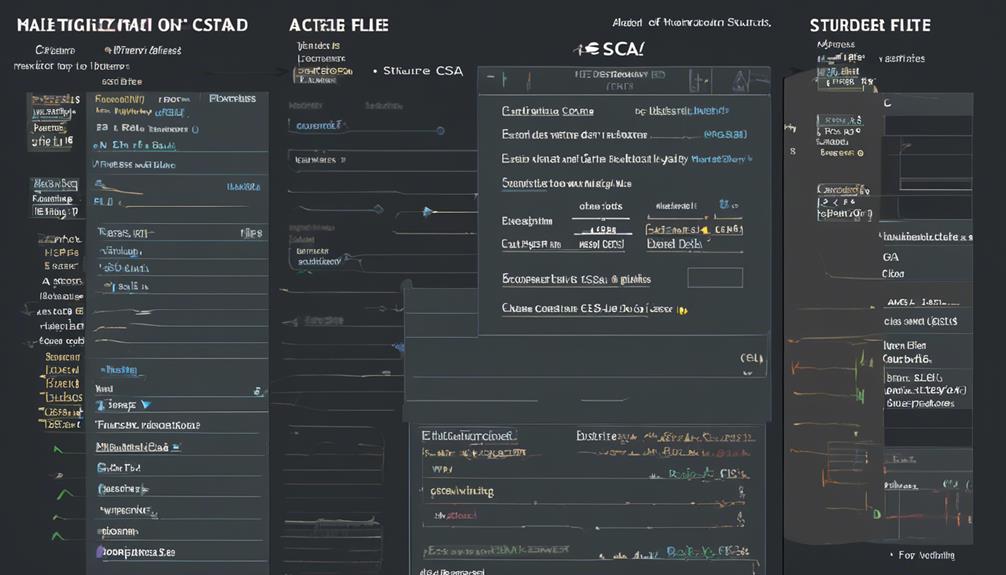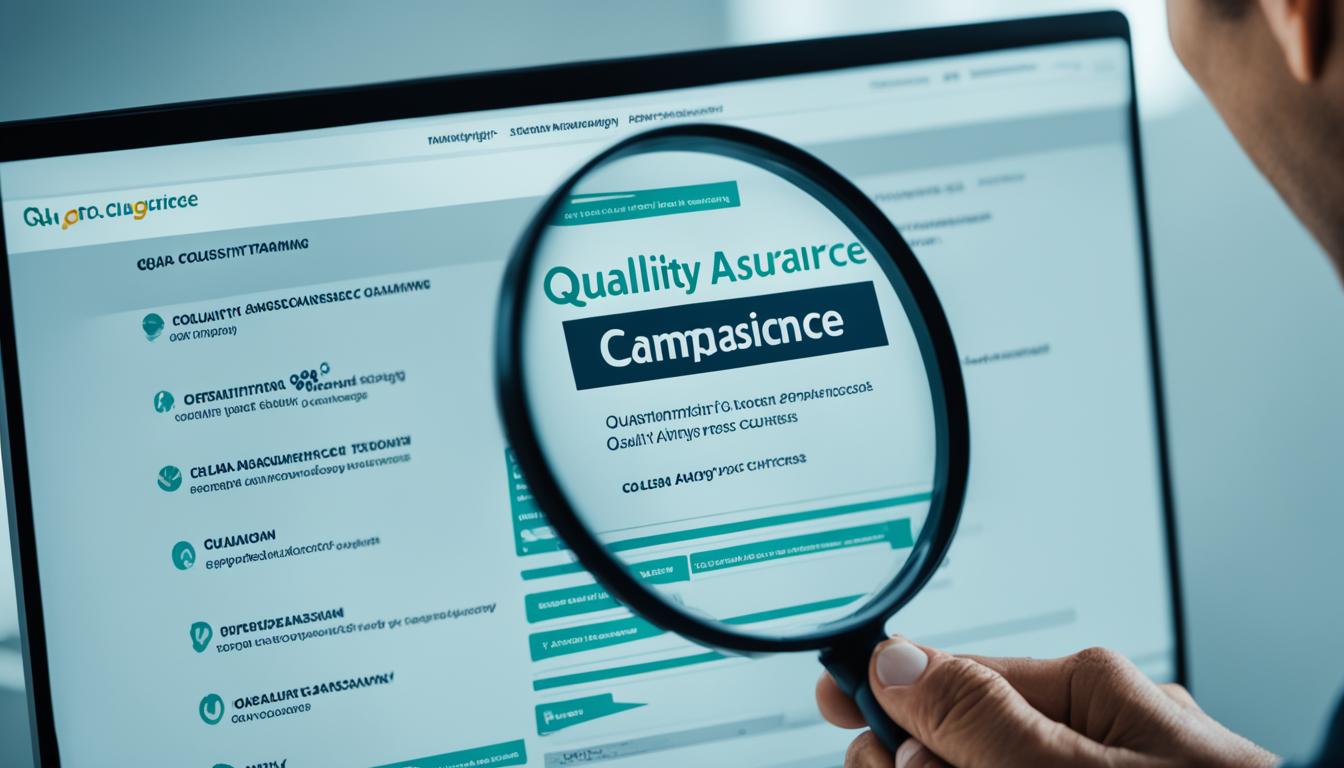What sets CSV and CSA apart in the realm of software validation that we are all familiar with?
It’s not just about the acronyms – there are fundamental differences in their approach and implications.
Understanding these variances is crucial for any company looking to streamline its software validation processes and allocate resources efficiently.
Let’s explore the nuances between CSV and CSA and how they impact the world of software validation.
Key Takeaways
- CSV focuses on software validation process and regulatory compliance, while CSA takes a risk-based approach and prioritizes risk mitigation.
- CSA encourages risk-based data organization and allows for adaptable data handling, resulting in streamlined and focused data records.
- Both CSV and CSA are crucial in regulated industries, with categories subject to these including immersed systems equipment and Document Management Systems (DMS).
- Transitioning from CSV to CSA involves adopting a risk-based approach, shifting to a quality-focused culture, and emphasizing rigorous testing and assurance activities.
Understanding CSV and CSA Basics
Understanding CSV and CSA basics involves distinct approaches to software validation and risk management.
CSV, or Computer System Validation, focuses on the validation process to ensure that software meets user needs and intended uses. This involves Installation Qualification (IQ), Operational Qualification (OQ), and Performance Qualification (PQ), with an emphasis on regulatory compliance and extensive documentation.
In contrast, CSA, or Computer Software Assurance, takes a risk-based approach, prioritizing risk mitigation and critical thinking over documentation. It involves identifying intended use, determining the risk-based approach, selecting appropriate assurance activities, and establishing records.
The shift from CSV to CSA is driven by the recognition of the challenges within CSV and the need for a more efficient and flexible method for software validation. The FDA has emphasized the importance of CSA, as it encourages considering the risks associated with software failures, ultimately enhancing patient safety.
By adopting CSA, companies like Greenlight Guru have streamlined their validation processes, aligning with FDA guidance and saving time on protocols and documentation. The benefits of CSA for MedTech companies include reducing the burden of software validation, focusing on high-risk software, simplifying implementation, and fostering the adoption of innovative technologies in medical devices.
This shift represents a significant advancement in the quality system for software assurance.
Variances in Data Structure

The shift from CSV to CSA in software validation methodologies directly impacts the variances in data structure, emphasizing a risk-based approach over extensive documentation. This shift brings about significant changes in how data is structured and managed during the software validation process. Here’s how the variances in data structure manifest:
- Risk-based Data Organization: CSA encourages the organization of data based on the identified risks associated with software failures, allowing for a more efficient and flexible method for software validation compared to the rigid structure of CSV.
- Adaptability in Data Handling: CSA’s focus on risk allows for the adoption of a more adaptable approach to data structuring, enabling the prioritization of high-risk software elements and the simplification of the implementation and adoption of software in production environments.
- Streamlined Data Records: CSA’s emphasis on establishing records is more targeted towards capturing risk-based assurance activities, leading to leaner and more focused data records compared to the extensive documentation required in CSV.
- Efficient Data Management: The risk-based approach of CSA results in a more streamlined and efficient data management process, reducing the burden of software validation for organizations and fostering the adoption of innovative technologies in medical devices.
Applications in Data Management
Applications in data management involve implementing strategies for efficient organization, storage, and utilization of data to ensure streamlined operations and compliance with regulatory requirements.
Both CSV and CSA play crucial roles in this process, particularly in industries such as medical devices, production, and quality systems, where adherence to FDA regulations is paramount.
CSV, or computer system validation, ensures data integrity, security, and compliance with regulations for computerized systems used in clinical trials and production environments. It involves planning the documentation process, defining acceptance criteria, and assigning roles and responsibilities.
On the other hand, the FDA’s CSA guidance provides a risk-based approach to software validation, emphasizing the consideration of software failures and appropriate assurance activities. This risk-based approach aligns with the industry’s shift towards a more proactive and adaptable quality system.
Categories of computerized systems subject to CSV and CSA include immersed systems equipment, Software COTS, spreadsheets, Document Management Systems (DMS), and Process Analytical Technology (PAT).
Planning, executing, and documenting validation activities are critical components of effective data management in these regulated environments.
Implications for Software Validation

In data management, the implications for software validation are significant in ensuring the integrity and compliance of computerized systems used in regulated industries. When considering the transition from CSV to CSA, the implications for software validation become crucial for maintaining high standards of quality and compliance with regulatory requirements.
The following points highlight the implications for software validation in this context:
- Regulatory Approach: Software validation is essential to meet regulatory requirements, especially in industries such as medical device quality, where the FDA mandates stringent validation processes to ensure patient safety.
- System Performance: Effective software validation ensures that computerized systems perform as intended, meeting the specified requirements for production or quality systems.
- Assurance Activities: Software validation activities provide assurance that the software/system functions reliably and consistently, contributing to the overall quality and compliance of the system.
- Transition to CSA: As the transition from CSV to CSA occurs, software validation becomes integral in understanding the intended use and high-risk features of computer systems, aligning with a quality-focused culture.
These implications emphasize the critical role of software validation in upholding the integrity, performance, and compliance of computerized systems within regulated industries.
Transitioning From CSV to CSA
Transitioning from CSV to CSA involves adopting a risk-based approach to software validation, shifting from a compliance-centric mindset to a quality-focused culture. This shift is crucial for ensuring patient safety and the production of high-quality medical devices. CSA encourages rigorous testing and assurance activities, reducing the burden of software validation for MedTech companies. This transition allows for a more targeted approach, focusing on high-risk software and innovative technologies, ultimately enhancing patient safety and regulatory compliance.
| CSV | CSA |
|---|---|
| Compliance-centric mindset | Risk-based approach |
| Documentation-focused | Quality-focused culture |
| Emphasis on validation | Emphasis on rigorous testing and assurance activities |
This shift requires careful consideration and planning, as it impacts the entire software development and validation process. Leveraging existing assurance activities and investing in the right Manufacturing Execution System (MES) is crucial for a successful transition. The MES plays a key role in ensuring compliance with CSA guidelines and enables the pursuit of automation and Industry 4.0, supporting MedTech companies in embracing the advancements in software assurance.
Frequently Asked Questions
What Is the Difference Between CSV and CSA Training?
We believe that the difference between CSV and CSA training lies in their approach.
CSV focuses on documentation and formal validation steps, while CSA emphasizes risk-based validation and critical thinking.
CSV traditionally aligns with FDA’s regulations, but CSA, like the approach adopted by Greenlight Guru, seeks to reduce the burden of validation and allocate resources efficiently.
This shift allows for a more targeted and risk-based approach to software validation in the medical device industry.
What Is the Difference Between CSV and Computer Software Assurance?
When distinguishing between CSV and computer software assurance, we recognize that:
- CSV focuses on ensuring software meets user needs through extensive testing.
- CSA emphasizes a risk-based approach to software validation.
This distinction allows for a comprehensive understanding of the differences in their application and benefits.
What Is the CSA Approach to Validation?
The CSA approach to validation emphasizes assessing software risks and allocating resources accordingly. It involves:
- Identifying intended use
- Determining risk-based approaches
- Selecting appropriate assurance activities
- Establishing records
Unlike CSV, CSA doesn’t change regulations but offers a more efficient and flexible method for software validation.
Greenlight Guru has adopted an automated, risk-based approach to validate their QMS software in alignment with FDA’s CSA guidance and ISO standards.
What Is CSA in Quality Assurance?
CSA in quality assurance involves a risk-based approach to software validation, focusing on mitigating software failures. It considers intended use, applies a risk-based approach, performs assurance activities, and establishes records.
This method aligns with FDA guidance and ISO standards, allowing us to efficiently validate our QMS software.
Benefits include reduced validation burden, resource allocation to high-risk software, and fostering innovation in medical devices.
Conclusion
In conclusion, the difference between CSV and CSA lies in their approach to software validation. While CSV relies on testing and extensive documentation, CSA takes a risk-based approach, focusing on high-risk software and offering a more efficient method for validation.
It’s clear that when it comes to software validation, the proof is in the pudding. Embracing CSA can help companies reduce the burden and allocate resources more effectively.
Randy serves as our Software Quality Assurance Expert, bringing to the table a rich tapestry of industry experiences gathered over 15 years with various renowned tech companies. His deep understanding of the intricate aspects and the evolving challenges in SQA is unparalleled. At EarnQA, Randy’s contributions extend well beyond developing courses; he is a mentor to students and a leader of webinars, sharing valuable insights and hands-on experiences that greatly enhance our educational programs.










